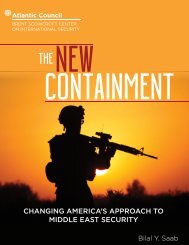POLITICS GOVERNANCE STATE-SOCIETY RELATIONS
Politics_Governance_and_State-Society_Relations_web_1121
Politics_Governance_and_State-Society_Relations_web_1121
Create successful ePaper yourself
Turn your PDF publications into a flip-book with our unique Google optimized e-Paper software.
<strong>POLITICS</strong>, <strong>GOVERNANCE</strong>, AND <strong>STATE</strong>-<strong>SOCIETY</strong> <strong>RELATIONS</strong><br />
and Paul Noble observed back in the 1990s that<br />
as the all-encompassing corporatist Arab state<br />
of the 1970s began to shrink and withdraw<br />
from various social, political, and economic<br />
domains, it left disorder behind because of the<br />
relative weakness of Arab civil society. 36 Clearly,<br />
building sustainable governance—inclusive,<br />
effective, transparent, and accountable<br />
governance—is not something state institutions<br />
can do alone. In addition to offering innovative<br />
policy ideas, civil society groups can organize<br />
citizen interests to ensure they are included<br />
in deliberations (and in a relatively efficient<br />
manner); educate the public on how to exercise<br />
their rights and take advantage of government<br />
services; share information with citizens about<br />
government operations and decisions; and<br />
monitor and report, and so hold governments<br />
accountable to citizens for the work they are<br />
doing. Civil society, as Secretary of State Hillary<br />
Clinton said in 2010, is an essential partner to<br />
governments in the work of<br />
national development and<br />
an essential foundation,<br />
along with government and<br />
the private sector, of any<br />
successful society. 37 Thus,<br />
fixing governance should<br />
begin with elevating and<br />
nurturing civil society and<br />
associational freedom.<br />
Below are some more specific<br />
prescriptions for a way forward;<br />
we will then turn to the role of outside actors,<br />
especially the United States.<br />
Ending civil wars is paramount—but so is fixing<br />
governance in existing states.<br />
The violence of the conflicts in Iraq, Syria, and Libya<br />
has pernicious effects on neighbors and on the<br />
opportunities for extremist growth and spread, and<br />
it is clear that a comprehensive effort to end these<br />
conflicts and rebuild order in these societies must<br />
be an urgent priority in any plan to restore regional<br />
stability. However, an exclusive or overwhelming<br />
focus on these problems could easily lead policy<br />
36 Saad Eddin Ibrahim, “Liberalization and Democratization in the<br />
Arab World: An Overview,” in Rex Brynen, Bahgat Korany, and<br />
Paul Noble, eds., Political Liberalization and Democratization in<br />
the Arab World, Volume 1: Theoretical Perspectives (Boulder,<br />
CO: Lynne Rienner, 1995) 37.<br />
37 Hillary Rodham Clinton, “Civil Society: Supporting<br />
Democracy in the 21st Century,” remarks at the Community<br />
of Democracies, July 3, 2010, http://www.state.gov/<br />
secretary/20092013clinton/rm/2010/07/143952.htm.<br />
. . . [A] state’s fealty<br />
to individual rights<br />
and its ability to<br />
manage pluralism<br />
peacefully go hand<br />
in hand.<br />
makers to overlook or mask the vulnerabilities of<br />
other states across the region, where continued<br />
governance challenges could easily burst into crisis<br />
due to internal or external shocks (for example, the<br />
death of President Abdelaziz Bouteflika in Algeria,<br />
a further sharp drop in oil prices in Saudi Arabia,<br />
or a contested succession when Mahmoud Abbas<br />
steps down from his simultaneous leadership of the<br />
Palestine Liberation Organization and Palestinian<br />
Authority). One thing the region cannot afford is<br />
more failed states—and preventing this outcome<br />
demands that policy makers devote swift and<br />
focused attention to the remaining areas of<br />
weakness.<br />
Inclusive governance and the avoidance of<br />
violence demand respect for human rights.<br />
Respect for the equality and rights of all citizens—a<br />
respect that is manifested and enforced by<br />
government, and inculcated by society—is an<br />
essential foundation for the kind of inclusive and<br />
intensive societal dialogue<br />
that is necessary to address<br />
the urgent challenges facing<br />
governance in the region: to<br />
prevent the resurgence of<br />
violence in societies emerging<br />
from conflict, to overcome<br />
political polarization or<br />
sectarianism, to restore social<br />
trust in governing institutions,<br />
and to manage pluralism.<br />
Indeed, a government’s evident<br />
commitment to human rights<br />
and equal treatment of its citizens is a key means<br />
to overcoming fears among disadvantaged groups<br />
of partial treatment by the state that drive them<br />
toward extra-systemic conflict. In this sense, a<br />
state’s fealty to individual rights and its ability to<br />
manage pluralism peacefully go hand in hand.<br />
Inclusive politics has likewise been shown to<br />
be a central foundation of economic success. 38<br />
As noted earlier, the inability of Arab autocrats<br />
to adjust the social contract through reform in<br />
the years before 2011 was due to their narrow,<br />
exclusive base of decision-making, producing<br />
reforms that exacerbated instead of resolved<br />
societal grievances. Popular grievances in the Arab<br />
world before 2011 resulted not just from material<br />
deprivation or conflicts over resource allocation,<br />
but from the exclusionary and partisan manner in<br />
which government decision-making occurred and<br />
still occurs in many places. Moreover, as fellow<br />
38 Acemoglu and Robinson, Why Nations Fail.<br />
ATLANTIC COUNCIL<br />
29



